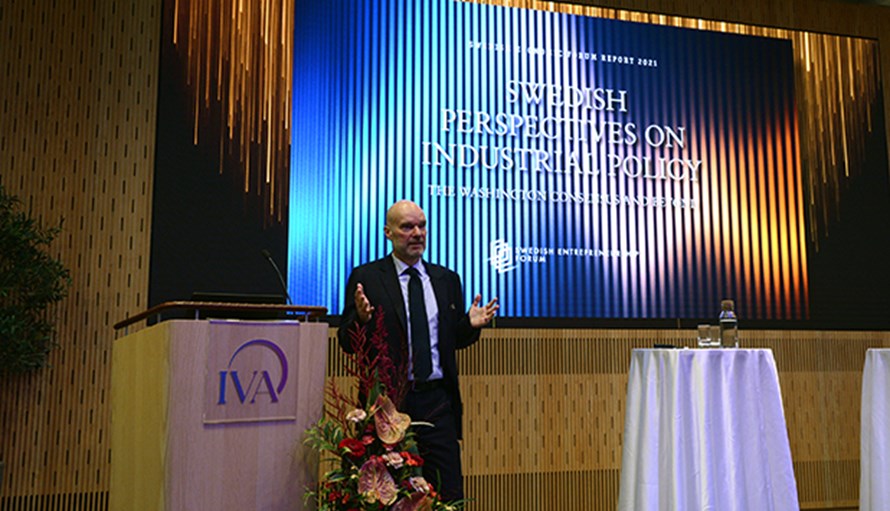Fredrik Sjöholm, CEO of IFN, presenting at the Swedish Entrepreneurship Forum's report launch. Photo: Marcus Kardelo, Entrepreneurship Forum.
Johan Eklund, the CEO of the Swedish Entrepreneurship Forum, opened the seminar by saying that industrial policy has long been a taboo subject but that it has now returned to the agenda, both politically and in terms of research. With the report, Entrepreneurship Forum wants to shed light on industrial policy from different perspectives, of which its significance for foreign direct investment is one. Fredrik Sjöholm's chapter deals with just this.
According to Fredrik Sjöholm, foreign direct investment provides several benefits for a country's economy. Multinational companies often have a high level of productivity, which leads to increased production, and that employees in such companies have a higher wage level. They are also generally good at dividing production chains by having different parts of production in different countries, which benefits growth. At the same time, a knowledge transfer can occur when staff in multinational companies change jobs to local companies in the host country. In this way, Swedish companies can, for example, take part in new technology. It is therefore important that Sweden succeeds in attracting strong, successful foreign companies.
There are measures to be taken to attract foreign direct investment, shows Fredrik Sjöholm's review of the research literature in the field. It is fundamental that there is a good general business climate, which can be achieved by, among other things, having economic and political stability, by having a trained workforce, by having good infrastructure with e.g., airports and ports, by having an open trade regime and by not having excessive taxes. However, the tax level can not compensate for shortcomings in the other areas:
- Donald Trump reduced corporation tax from about 35 percent to 21 percent, and at the same time, he introduced tariffs on imports from China and the EU, among others. This led to a decrease in foreign direct investment, said Fredrik Sjöholm at the seminar.
The factors that should be in place to favor foreign direct investment also benefit local businesses. If you ensure that a country has a good national business climate, you will automatically also attract more foreign direct investment, according to Fredrik Sjöholm.
According to Sjöholm, there is room for improvement in Sweden in three areas: the education system, the electricity supply, and taxes. That the quality of the education system has fallen is Sweden's biggest problem and even if it is now heading in the right direction, the loss can take many years to correct, according to Fredrik Sjöholm. That companies are worried about whether the electricity supply in Sweden is stable is another threat to the willingness to invest in the country. Taxes have admittedly fallen but are still high in relation to tax levels in other countries, he said.
The seminar was also attended by Anna Almqvist, economist at the Confederation of Swedish Enterprise, Davide Castellani, professor at the University of Reading, Nina Czernich, vice president of the IFO Center for Industrial Organization and New Technologies, Enrico Deiaco, research director Entrepreneurship Forum, Philip McCann, professor at the University of Sheffield and Bo-Erik Pers, CEO of Jernkontoret.

